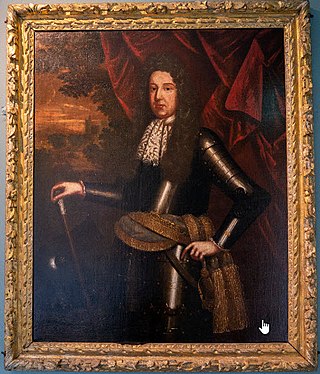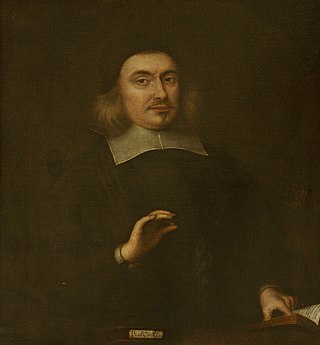
Thomas Bailey or Bayly (died c. 1657) was a seventeenth-century English religious controversialist, a Royalist Church of England clergyman who converted to Roman Catholicism.

Thomas Bailey or Bayly (died c. 1657) was a seventeenth-century English religious controversialist, a Royalist Church of England clergyman who converted to Roman Catholicism.
Bailey's father was Lewis Bayly, Bishop of Bangor, and a brother was the scholar and clergyman John Bayly (1595/6–1633). Bailey was educated at Magdalene College, Cambridge. [1] He began as a priest within his father's diocese; in 1634 he became Rector of Holgate, Shropshire, and in 1638 the sub-dean of Wells. He served as a commissioned officer in defence of Raglan Castle in 1646, and was briefly imprisoned in Newgate gaol for writing against the Commonwealth after Charles I was executed in 1649.
In that year he also defended Charles against allegations that he had been a Roman Catholic. In Certamen Religiosum he reported on religious discussions from 1646 between Charles and Henry Somerset, 1st Marquess of Worcester, at Raglan Castle. Bailey attended the Marquess, as his chaplain. [2] The work proved controversial, and was attacked by Hamon L'Estrange, [3] Christopher Cartwright, and Peter Heylyn.
However, Bailey then made his way to Europe, and had himself converted to Catholicism by the time of his 1654 End to Controversy. A Life of John Fisher was issued under Bailey's name in 1655, though it was in fact a re-publication of a much earlier text which Richard Hall (died 1604) had translated into Latin. [4]

Duke of Beaufort is a title in the Peerage of England. It was created by Charles II in 1682 for Henry Somerset, 3rd Marquess of Worcester, a descendant of Charles Somerset, 1st Earl of Worcester, legitimised son of Henry Beaufort, 3rd Duke of Somerset, a Lancastrian leader in the Wars of the Roses. The name Beaufort refers to a castle in Champagne, France. It is the only current dukedom to take its name from a place outside the British Isles.

Henry Somerset, 1st Duke of Beaufort, KG, PC was a Welsh politician who sat in the House of Commons at various times between 1654 and 1667, when he succeeded his father as 3rd Marquess of Worcester. He was styled Lord Herbert from 1644 until 3 April 1667. The Dukedom of Beaufort was bestowed upon him by King Charles II in 1682.

Edward Somerset, 4th Earl of Worcester, KG, Earl Marshal was an English aristocrat. He was an important advisor to King James I, serving as Lord Privy Seal.

Henry Somerset, 1st Marquess of Worcester was an English aristocrat, who was a prominent and financially important Royalist during the early years of the English Civil War.

Edward Somerset, 2nd Marquess of Worcester, styled Lord Herbert of Raglan from 1628 to 1644, was an English nobleman involved in royalist politics, and an inventor.

John Goodwin (1594–1665) was an English preacher, theologian and prolific author of significant books.

John Bramhall, DD was an Archbishop of Armagh, and an Anglican theologian and apologist. He was a noted controversialist who doggedly defended the English Church from both Puritan and Roman Catholic accusations, as well as the materialism of Thomas Hobbes.

Sir Donough MacCarty, 1st Earl of Clancarty (1594–1665), was an Irish soldier, and politician. He succeeded his father as 2nd Viscount Muskerry in 1641. He rebelled against the government, demanding religious freedom as a Catholic and defending the rights of the Gaelic nobility in the Irish Catholic Confederation. Later, he supported the King against his Parliamentarian enemies during the Cromwellian conquest of Ireland, a part of the Wars of the Three Kingdoms, also known as the British Civil War.

Sir Gilbert Pickering, 1st Baronet, 10 March 1611 to 17 October 1668, was a member of the landed gentry from Northamptonshire, and a religious Independent who supported Parliament in the Wars of the Three Kingdoms. An MP for Northamptonshire for most of the period from 1640 to 1660, during the 1649 to 1660 Interregnum he also served as Lord Chamberlain, sat on the English Council of State, and was appointed to Cromwell's Upper House in 1658.
Events from the year 1646 in England. This is the fifth and last year of the First English Civil War, fought between Roundheads (Parliamentarians) and Cavaliers.

Rev. John Conant D.D. was an English clergyman, theologian, and Vice-Chancellor of Oxford University.
Henry Lawrence (1600–1664) was an English Puritan statesman. He graduated from Emmanuel College, Cambridge with an M.A. in 1627. He was commissioner of plantations in 1648, and a commissioner for Ireland in 1652. He served as an M.P. Hertfordshire and Carnarvonshire. He was appointed Keeper of the Library at St. James's House, in 1653. He was Lord President of the Council of State from 1654 until 1659. He also published three pamphlets between 1646 and 1649 on the doctrine of baptism.
1646 was the fifth and final year of the First English Civil War. By the beginning of 1646 military victory for the Parliamentary forces was in sight. A Royalist army was defeated in the field at the Battle of Torrington on 16 February and the last Royalist field army was defeated at the Battle of Stow-on-the-Wold on 21 March. From then on the New Model Army mopped up the remaining Royalist strongholds. The politics moved into a post war phase with all major the factions in England and Scotland, trying to reach an accommodation with King Charles I that would further their own particular interests.
Christopher Cartwright (1602–1658) was an English clergyman, known as a Hebraist and for his use of targums in Biblical exegesis, following the lead of Henry Ainsworth with John Weemes.

Major-General Sir Thomas Morgan, 1st Baronet was a professional soldier from Wales who fought for Parliament during the Wars of the Three Kingdoms. As deputy Commander-in-Chief, Scotland, he played an important role in the 1660 Stuart Restoration and was rewarded with being made a baronet.
Nathaniel Hardy (1618–1670) was an English churchman, Dean of Rochester from 1660.
Richard Hollinworth (1607–1656) was an English clergyman of presbyterian views, an influential figure in North-West England in the 1640s.
Ratcliffe Gerard of Halsall, Lancashire was an English landowner who served in the Royalist army during the Wars of the Three Kingdoms.

Richard Wiseman (1622–1676) was an English surgeon, the first consultant surgeon in London. He was personal surgeon to King Charles II, and author of a medical work called Severall Chirurgical Treatises.